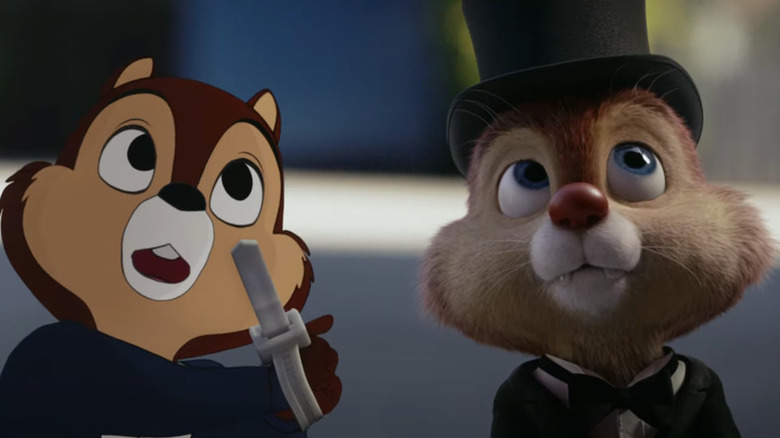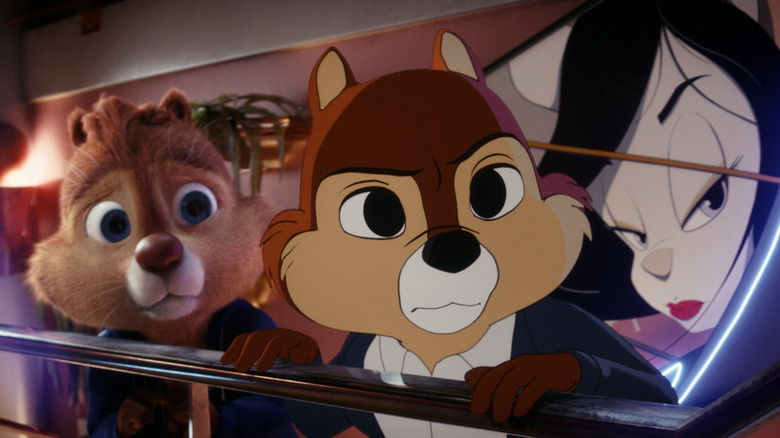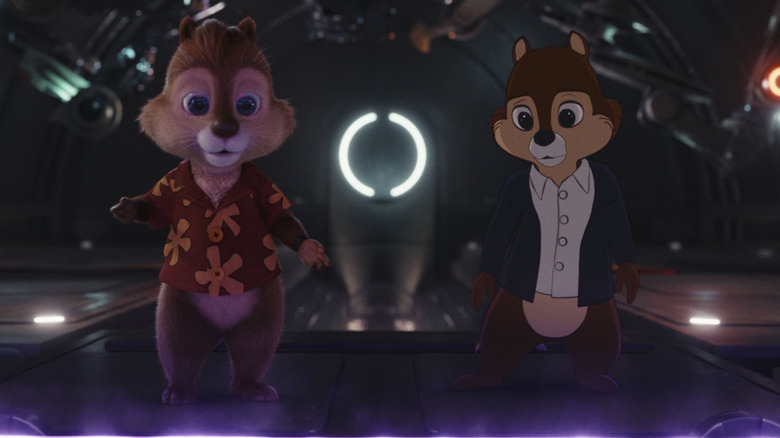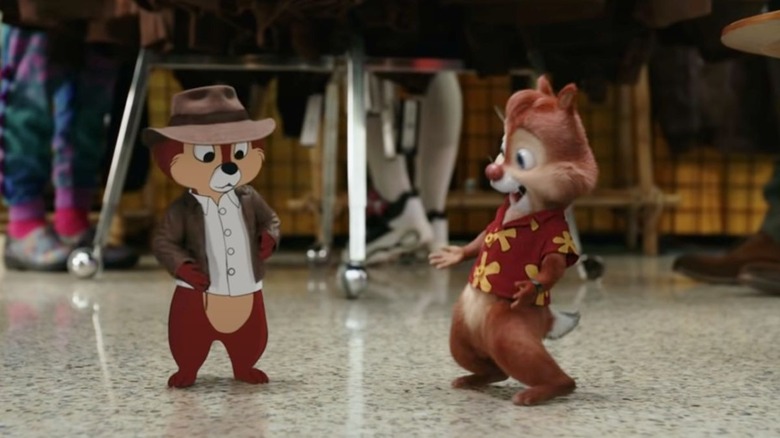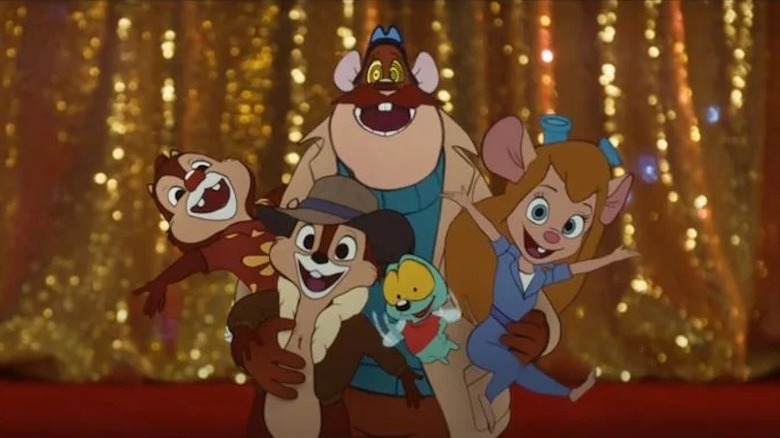Chip 'N Dale: Rescue Rangers Writers Doug Mand And Dan Gregor Talk About Creating A Spiritual Successor To Who Framed Roger Rabbit [Interview]
While it wasn't around for a long time, "Chip n' Dale: Rescue Rangers" was certainly here for a good time. With only 65 episodes that aired from March 4, 1989, to November 19, 1990 during its initial run on The Disney Channel, the animated series about a team of pint-sized detectives found new life in syndication as part of the Disney Afternoon block of programming. That was enough to firmly place this cartoon into the hearts and minds of a generation of '90s kids. And having one of the catchiest theme songs ever created didn't hurt either.
Now, with those '90s kids all grown up, they're the ones that have a hand in all the reboots and revivals popping up all over Hollywood these days. However, when the writing team of Dan Gregor and Doug Mand decided to present their own take on the Rescue Rangers that would become a hybrid animated/live-action satire for Disney+, they didn't simply limit their tale to just another mystery of the week featuring the cheeky chipmunks Chip and Dale. The duo was inspired by "Who Framed Roger Rabbit," and basically went off to the races with a modern spin on a Hollywood where humans and toons lived and worked side by side. Also, they ended up writing a love letter to animation and animation fans from the past 30 years.
In our interview with the writers, we touch on how this "sequel" to the fan-favorite cartoon came together, how even they're surprised by how much they managed to get away with, and parody law. Plus, they touch on the secret to maintaining a long-term relationship that can be applied well beyond a writing partnership.
Toontown rewritten
My first question is about the reception of your script. Were Chip and Dale happy with your portrayals of them, or did you receive copious chipmunk-sized notes?
[laughs]
Dan Gregor: Dale is, as you can imagine, a complicated producer to work with.
Doug Mand: Chip didn't read it until after we shot it, so he was just like, "I guess. OK."
At what point in the development did the movie become somewhat of a spiritual successor to "Who Framed Roger Rabbit"? Was that your approach, or did it come to you that way?
Gregor: Right from the outset when we started thinking about it, we want to do this meta version of [Chip and Dale] as actors playing the characters, the Rescue Rangers, so it obviously brings Roger Rabbit to mind immediately. It really became important to us to think about this as in-universe with Roger Rabbit basically. And Roger Rabbit, a movie that we are obsessed with, we genuinely think is one of the best movies, one of my favorite movies of all time. That movie takes place in the '50s, was made in the late '80s, and at that point, there's a lot less diversity of animation styles.
One of the things that we had to really think about was what's happened in the 30-plus years of animation since then. There's a whole new world of animation styles, types, places it comes from, technology that creates it. For us, we really wanted to make sure that we were asking and answering those questions of what does it look like to be a cartoon actor now in Hollywood. And even just the simple stuff of, "What is it like to be a six-inch person living in Los Angeles?" That sort of stuff was really fun for us.
Mand: Yeah, it was the cornerstone of our approach to it. It was definitely our idea. From the very first draft, we wanted to do what Roger Rabbit does so well, [which] is not talking down to the animated characters [and] playing it real and to the top of your intelligence. Bob Hoskins in ["Who Framed Roger Rabbit"] is a real and flawed character. Sometimes hybrid movies have a feeling of just talking down to children, the audience, and not dealing with real emotions and just living in a wacky world. Something "Roger Rabbit" does so well is living in an emotional reality of people and toons living with regret, living with fear, living with dreams and aspirations, and all those things. It's one of our favorite movies. The fact that we got a chance to do a movie that we hope felt like a spiritual sequel to it or in the same world of it is a dream come true.
The unusual suspects
Just like "Who Framed Roger Rabbit," there were a ton of great cameos and references throughout "Chip n' Dale: Rescue Rangers." Were there any in particular that were hard to get or some that you wanted in the script but didn't end up in the finished product?
Mand: [When] we were writing it[, it was] easy for us to sit there and be like, "Who do we want to see?" and just put it in. The whole time we're writing this movie, we're like, "They're never going to make this. This can't actually happen, so let's just keep writing it." To Disney's credit, to Mandeville our producer, and then to Akiva's credit, everyone really got on board with this idea of throwing the history of animation in there.
Again, one of the joys of "Roger Rabbit" is seeing Warner Brothers characters with Disney characters, and everyone really got behind that. I would say that it's the true shocker of this movie that it got made the way it did. Every character you see in that movie [is] a different negotiation and that's testament to Disney lawyers, Akiva calling in favors, our producers Todd Lieberman and Alex Young, [and] everyone really going out of their way.
So yeah, we've had tons of iterations where there were different cameos at certain points, but the shocking part is how many of them actually made it. Dan and I still don't believe this movie is real until it gets released on Disney+. We don't think that it's real yet.
Gregor: There could be a legal injunction coming soon.
Do you have a favorite cameo or reference that made it into the movie?
Gregor: I am blown away and so delighted that MC Skat Kat and Paula Abdul are in this movie. That's in the trailer, so maybe you've seen it already. But that's a deep cut childhood reference that I was always obsessed with. The balance of this movie of how arcane can the references be before people have no idea what you're talking about was always something that I think we were up against. Because the weirder it tickles the back of your brain, the more funny it is to me. But then of course, you're at a point where it's like, "That's a joke for three people." I think the fact that those two are in this movie really gives me an endless amount of joy.
I love that. That's so fun. I'm a big fan of "A Goofy Movie," so seeing Bigfoot among the Bootleg Tunes was fun. Another one of my favorites was Tigra from "Avengers: United We Stand." It makes me happy that other people remember that cartoon.
Mand: That's great. I think that honestly this joy is the experience we wanted when we were writing it. It's how we felt, the excitement. We're hoping that people feel that when they watch it. They're like, "Oh, I can't believe that's in there. Are you serious?" We feel like there's enough in there that it should speak to lots of people because we cover a large amount of space, a lot of ground in terms of the history of animation and obscure characters and famous characters.
All those characters in there, they came from our heads or [from director] Akiva Schaffer, who just has a wonderful imagination and shares the love of Roger Rabbit. Akiva is so amazing and [was] like, "I want every frame to be an absolute feast for your eyes. I want you to have to pause it and look at it." He totally embraced what was in our script and then just made it so much better by just going for it times a hundred.
All aboard
I feel like you all really succeeded in creating something that has a lot of great rewatch value. I've seen it twice now already and I saw a bunch of different things that I missed the first time and like you said, it's been a joy to watch. But as I was watching, I had a lot of these moments where I was just like, "How did they get away with saying stuff like that?" How did you get studios to sign off on in a way openly mocking, criticizing, or just having fun with some of the most iconic characters ever?
Gregor: To what Doug was saying, every single one of those specifics is its own individual debate negotiation. Some of those things are different as we've hit walls that we couldn't overcome, but a stunning amount of them were overcome either through favors, the lawyers really working their ass off, the producers working their ass off, Akiva figuring it out and who to talk to, or just the lawyers telling us, "Hey, if you say this line a little bit differently, it falls under parody law and you can use it that way. It's satirical." Every single one of these moments that you might feel a jolt of joy, that "How is that there? Why is that there?" is a very particular conversation, negotiation, debate that we had to get into. We're just very gratified and happy that hopefully people are getting joy from each of those little bouts of labor that we put into to putting it up on screen.
Mand: It's a true testament to people getting on board with this movie. Disney did get on board with this and they were like, "Let's see what we can make happen." Akiva especially was like the forefront of that and making it important. We're just as shocked as you are, if not more shocked that things got through. We've made studio films before and we've heard no quite a bit, so the fact that you saw what you saw is a shock to us.
Was there anything that Disney was like, "Absolutely not. We can't go there at all."?
Gregor: Maybe in future interviews, we'll discuss that.
You mentioned parody law. Exactly how fine of a line is that?
Gregor: It's very specific. You have to be making commentary about them as opposed to just using them. If you want to reuse someone else's property and again, the line is very thin-
Mand: It's also not always. It moves sometimes. There's not a direct science to it, right?
Gregor: Yeah. It's almost like what's the lawyer's appetite for it? If they feel like they're taking on someone litigious, then they'll probably be more bulletproof in it. If they feel like they can massage a relationship or they're not so worried about it, then they can be a little more loose. We're not lawyers by any means, so getting into those types of conversations are always one of the funniest, weirdest parts of being a writer where you're negotiating against a concept and writing towards legalese that you don't even know. But not in a bad way. It's like there are boundaries and guidelines that are fun challenges for us to have to work within sometimes.
That's so interesting. They don't really teach you that in screenwriting school.
Gregor: No, they don't. They don't.
Mand: And they probably don't need to.
Gregor: Yeah, they do that in law school.
Let's stay together
Like Chip and Dale, you two have been a dynamic duo throughout your careers, from "How I Met Your Mother" to "Crazy Ex-Girlfriend" and all the other amazing projects you've worked on. You've managed to stick together through a lot. What's your secret to staying together creatively and not splitting up for decades only to be reunited by a caper?
Mand: It obviously infused a lot of the movie for us. We met in a writing class over a shared love of comedy and writing, started performing. I never thought that I would make a living writing comedy with Dan when I met him and we started doing sketch comedy.
The key, and I hope is some kind of takeaway from this movie without being cheesy, is the importance of communication, of just saying how you feel. I think a lot of relationships end and five years later, you can't remember exactly why they ended. There's this void where they once were and how much easier it would've been in the moment to say, "Hey, this hurt my feelings." Or, "I'm feeling sad about this." Having a conversation, having that difficult conversation in the moment can save a relationship. And then [you're] able to acknowledge it and move on.
It's not always the most natural thing, but what ends up happening is your business partners become your best friends or vice versa because you spend so much time together. There is a lot of ways that can go wrong, especially if you let resentment build, if you let things go unsaid. I think the biggest thing I would say for us is when one of us hurts the other one unintentionally or has a feeling, you got to just say it, talk about it, and recognize that neither of us are trying to hurt one another. And say, "I love you." Acknowledge it and let go of the anger.
Gregor: I love you, Doug.
Mand: I love you too, Dan. It does sound silly, but I think it's very real and I hope it's something that people take away because this is a movie about a friendship that shouldn't have ended and is worth saving.
Speaking of the friendship that shouldn't have ended, has there been any talks of continuing your take on the Rescue Rangers?
Gregor: Hey, you know as much as us. I think you actually have more power than us at this point in that regard. If you write some nice things about it on the internet, we might actually get to do some more of these. We would love to, we have more ideas. We think this is a really rich world with its own really fun internal logic that we would love nothing more than to keep making stuff within. But that's above our pay grade.
"Chip n' Dale: Rescue Rangers" premieres on Disney+ on May 20, 2022.
